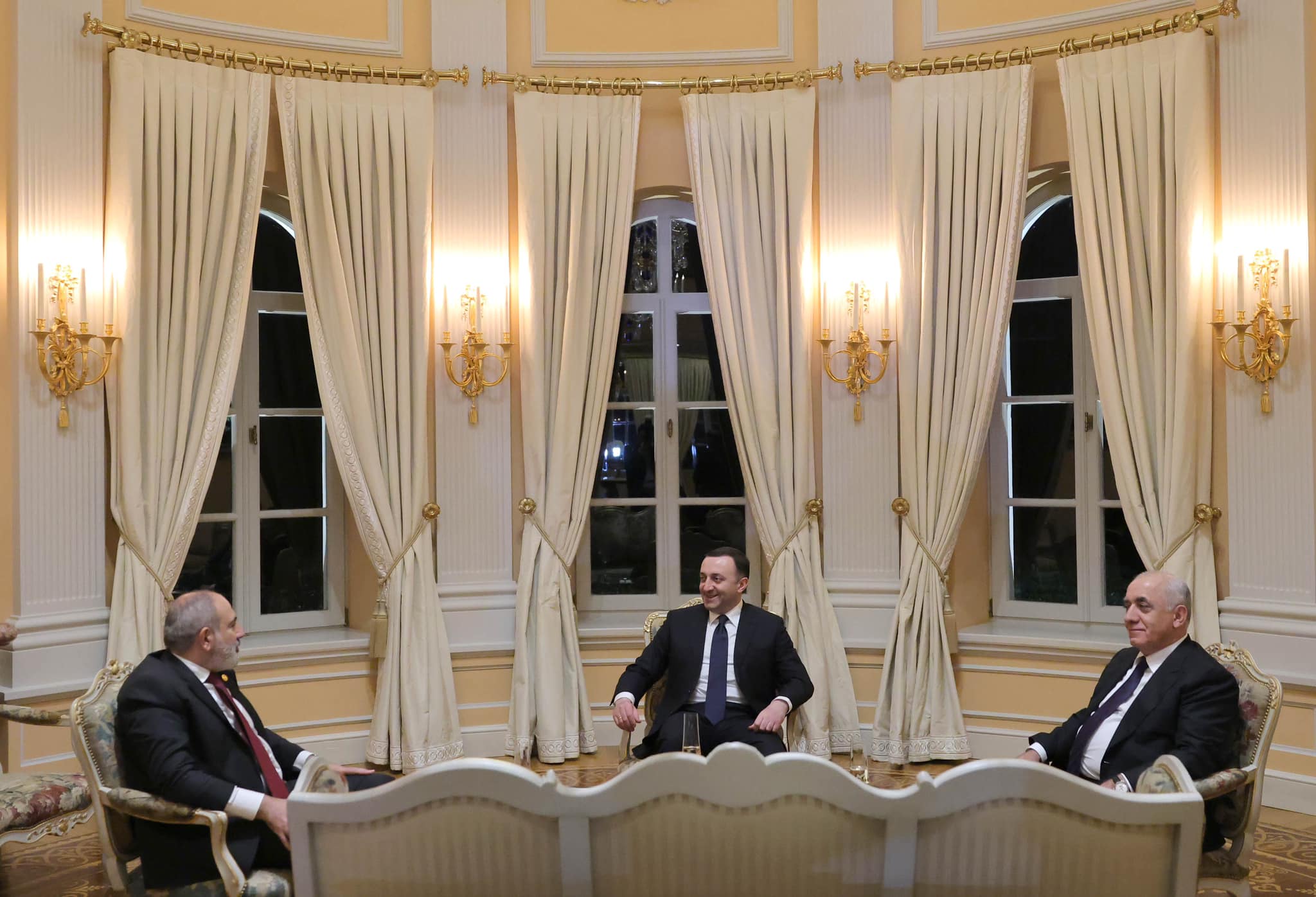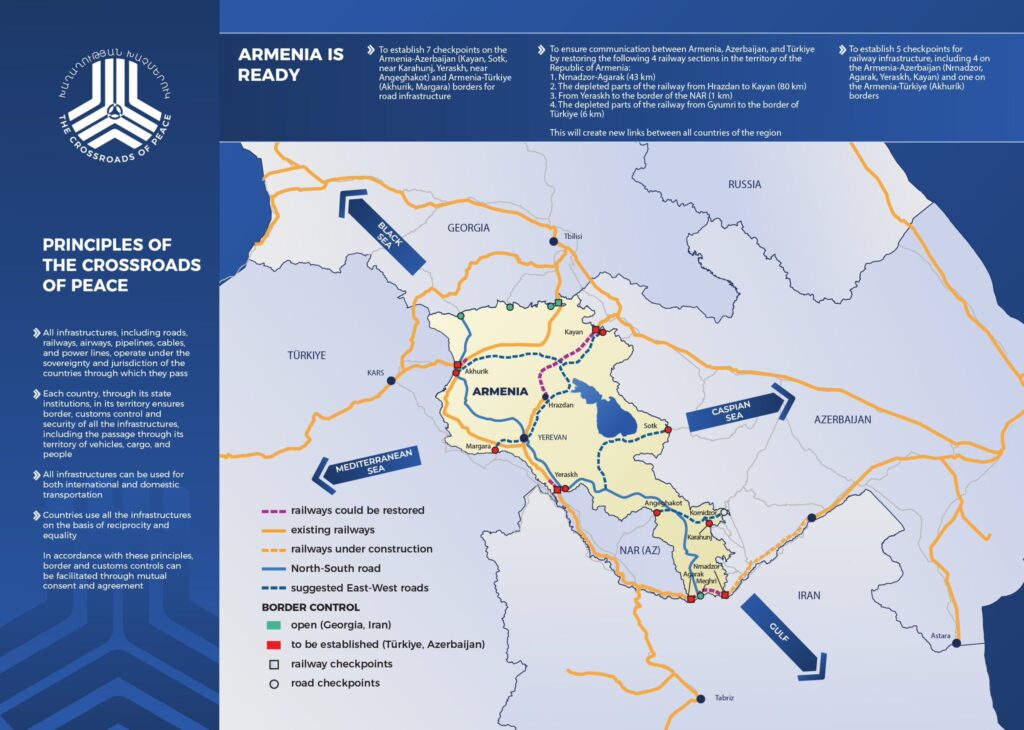Armenian, Azerbaijani and Georgian Prime Ministers address Tbilisi Silk Road Forum
In recent days, Georgia once again hosted the Tbilisi Silk Road Forum, an event with an economic focus. What is new this year is that for the first time an Armenian leader spoke at such a high-level event in Tbilisi, and high-level officials from all three South Caucasus countries were also on the same stage

Armenia-e-Azerbaijan-si-incontrano-al-Tbilisi-Silk-Road-Forum
Three Prime Ministers talk - Official photo
On 26-27 October, the Georgian capital once again hosted the Tbilisi Silk Road Forum, an event to discuss global economic challenges and international connectivity established by the Georgian government in 2015. The fourth edition was attended by around 2,000 delegates representing the governments and private sector from over 80 countries.
Georgian Prime Minister Irakli Garibashvili naturally opened the forum, but so did the Prime Ministers of Armenia, Azerbaijan, and Montenegro. More significantly, however, not only was it the first time an Armenian leader spoke at such a high-level event in Tbilisi, but it was also the first time that high-level officials from all three countries gathered on the same stage to do so.
Though the main focus was economic, Garibashvili used the opportunity to offer Georgia’s assistance to Armenia and Azerbaijan in facilitating or mediating talks. The last time Tbilisi had made this offer was alongside Azerbaijan President Ilham Aliyev on his visit to Georgia on 8 October. In recent weeks, Baku has increasingly pushed the narrative that the region’s problems should be resolved within and not outside the region.
During that visit, Aliyev even suggested that Armenia and Azerbaijan could hold meetings at various levels in Tbilisi “immediately” if Yerevan agreed. However, in an interview with Armenian Public Television two days later, the Armenian Prime Minister clearly seemed reluctant to so, wary that this could threaten the continuation of efforts by the European Union. Such concerns are not unfounded.
For nearly a year, Baku has become increasingly frustrated with the EU-facilitated platform and what it believes to be French interference in the process. Aliyev had already pulled out of two scheduled EU-organised talks in October, first in Granada and then in Brussels. Moreover, since Aliyev’s Tbilisi visit, many Azerbaijani analysts have publicly advocated for holding the talks in Georgia.
Yet, despite Pashinyan’s concerns, these might now be starting. At the gala dinner on the first day of the forum, the Armenian, Azerbaijani, and Georgian Prime Ministers sat together on their own, while other guests huddled around tables seating five or more. Asadov, Garibashvili, and Pashinyan also held albeit likely informal but private talks lasting “several hours”. True, Asadov does not hold much power in Azerbaijan, but it was still an unprecedented occurrence.
“We held tripartite meetings yesterday”, Garibashvili said the following day . “Georgia is interested in being an unbiased mediator and in establishing peace in the region as a friend of Armenia and Azerbaijan”.
After news of the meeting broke, the Armenian Prime Minister’s office said the talks were “useful in terms of clarifying nuances of the positions of the parties in at least a number of issues”, though no other details were provided. It is quite possible, however, that one topic was unblocking region transportation links. Pashinyan’s address detailed his own idea in this direction – a “Crossroads of Peace” connecting and benefiting all countries in the region.
Asadov’s speech made no reference to Armenia, including in future regional projects. After his scripted address, he reacted spontaneously to Pashinyan. Baku had offered Yerevan the chance to sign a peace treaty two years ago and that offer remains on the table. Given Armenia’s regional semi-isolation, however, he did warn that failure to reach an agreement will mean a planned link to connect with its Nakhichevan exclave could go via Iran and not Armenia.
On 7 October, Azerbaijani and Iranian officials had already attended a ceremony to mark the construction of bridges and the necessary customs infrastructure to do so. Despite the stipulation in the November 2020 ceasefire statement that such a route would pass through Armenia, continued disagreement with Azerbaijan over the modalities of what Baku refers to as the “Zangezur Corridor” has delayed and frustrated those plans for three years now.
Arguably, Pashinyan’s address at the Tbilisi Silk Road Forum demonstrated he was aware that Armenia might again miss out on another regional project – the Middle Corridor connecting China through Central Asia and the South Caucasus to Europe. Just as he did in his 17 October address to the European Parliament , Pashinyan now offers his concept for an “Armenian Crossroads”, now rebranded as the “Crossroads of Peace”.
Recently Pashinyan announced that Yerevan established a special unit in the police force that will specifically provide security on all transit routes running through Armenian territory, likely in response to one sticking point over any Armenian route connecting Azerbaijani with Nakhchivan. The November 2020 ceasefire statement stipulated that it would be overseen by the Russian Border Guard Service. For Pashinyan, this would amount to loss of sovereignty.
Armenian opposition voices, however, remain skeptical , arguing that such an idea is not new and has been floated by previous administrations. Moreover, they complain, the map that Pashinyan used for this Tbilisi Silk Road Forum omitted any sign of the previous existence of the former Soviet-era Nagorno Karabakh Autonomous Oblast (NKAO). This was not unexpected. Armenia effectively recognised Azerbaijan’s territorial integrity last year and continues to do so.
Though it is uncertain whether Armenia and Azerbaijan are now ready to sign a long-awaited agreement to normalise relations, statements by officials from both sides indicate that such a possibility remains within reach. Meanwhile, at a European Council summit held on 26-27 October in Brussels, EU leaders called “on the parties to engage in good faith and to finalise this process by the end of this year”. Tbilisi, incidentally, has already offered to host any signing ceremony.
Featured articles
Armenian, Azerbaijani and Georgian Prime Ministers address Tbilisi Silk Road Forum
In recent days, Georgia once again hosted the Tbilisi Silk Road Forum, an event with an economic focus. What is new this year is that for the first time an Armenian leader spoke at such a high-level event in Tbilisi, and high-level officials from all three South Caucasus countries were also on the same stage

Armenia-e-Azerbaijan-si-incontrano-al-Tbilisi-Silk-Road-Forum
Three Prime Ministers talk - Official photo
On 26-27 October, the Georgian capital once again hosted the Tbilisi Silk Road Forum, an event to discuss global economic challenges and international connectivity established by the Georgian government in 2015. The fourth edition was attended by around 2,000 delegates representing the governments and private sector from over 80 countries.
Georgian Prime Minister Irakli Garibashvili naturally opened the forum, but so did the Prime Ministers of Armenia, Azerbaijan, and Montenegro. More significantly, however, not only was it the first time an Armenian leader spoke at such a high-level event in Tbilisi, but it was also the first time that high-level officials from all three countries gathered on the same stage to do so.
Though the main focus was economic, Garibashvili used the opportunity to offer Georgia’s assistance to Armenia and Azerbaijan in facilitating or mediating talks. The last time Tbilisi had made this offer was alongside Azerbaijan President Ilham Aliyev on his visit to Georgia on 8 October. In recent weeks, Baku has increasingly pushed the narrative that the region’s problems should be resolved within and not outside the region.
During that visit, Aliyev even suggested that Armenia and Azerbaijan could hold meetings at various levels in Tbilisi “immediately” if Yerevan agreed. However, in an interview with Armenian Public Television two days later, the Armenian Prime Minister clearly seemed reluctant to so, wary that this could threaten the continuation of efforts by the European Union. Such concerns are not unfounded.
For nearly a year, Baku has become increasingly frustrated with the EU-facilitated platform and what it believes to be French interference in the process. Aliyev had already pulled out of two scheduled EU-organised talks in October, first in Granada and then in Brussels. Moreover, since Aliyev’s Tbilisi visit, many Azerbaijani analysts have publicly advocated for holding the talks in Georgia.
Yet, despite Pashinyan’s concerns, these might now be starting. At the gala dinner on the first day of the forum, the Armenian, Azerbaijani, and Georgian Prime Ministers sat together on their own, while other guests huddled around tables seating five or more. Asadov, Garibashvili, and Pashinyan also held albeit likely informal but private talks lasting “several hours”. True, Asadov does not hold much power in Azerbaijan, but it was still an unprecedented occurrence.
“We held tripartite meetings yesterday”, Garibashvili said the following day . “Georgia is interested in being an unbiased mediator and in establishing peace in the region as a friend of Armenia and Azerbaijan”.
After news of the meeting broke, the Armenian Prime Minister’s office said the talks were “useful in terms of clarifying nuances of the positions of the parties in at least a number of issues”, though no other details were provided. It is quite possible, however, that one topic was unblocking region transportation links. Pashinyan’s address detailed his own idea in this direction – a “Crossroads of Peace” connecting and benefiting all countries in the region.
Asadov’s speech made no reference to Armenia, including in future regional projects. After his scripted address, he reacted spontaneously to Pashinyan. Baku had offered Yerevan the chance to sign a peace treaty two years ago and that offer remains on the table. Given Armenia’s regional semi-isolation, however, he did warn that failure to reach an agreement will mean a planned link to connect with its Nakhichevan exclave could go via Iran and not Armenia.
On 7 October, Azerbaijani and Iranian officials had already attended a ceremony to mark the construction of bridges and the necessary customs infrastructure to do so. Despite the stipulation in the November 2020 ceasefire statement that such a route would pass through Armenia, continued disagreement with Azerbaijan over the modalities of what Baku refers to as the “Zangezur Corridor” has delayed and frustrated those plans for three years now.
Arguably, Pashinyan’s address at the Tbilisi Silk Road Forum demonstrated he was aware that Armenia might again miss out on another regional project – the Middle Corridor connecting China through Central Asia and the South Caucasus to Europe. Just as he did in his 17 October address to the European Parliament , Pashinyan now offers his concept for an “Armenian Crossroads”, now rebranded as the “Crossroads of Peace”.
Recently Pashinyan announced that Yerevan established a special unit in the police force that will specifically provide security on all transit routes running through Armenian territory, likely in response to one sticking point over any Armenian route connecting Azerbaijani with Nakhchivan. The November 2020 ceasefire statement stipulated that it would be overseen by the Russian Border Guard Service. For Pashinyan, this would amount to loss of sovereignty.
Armenian opposition voices, however, remain skeptical , arguing that such an idea is not new and has been floated by previous administrations. Moreover, they complain, the map that Pashinyan used for this Tbilisi Silk Road Forum omitted any sign of the previous existence of the former Soviet-era Nagorno Karabakh Autonomous Oblast (NKAO). This was not unexpected. Armenia effectively recognised Azerbaijan’s territorial integrity last year and continues to do so.
Though it is uncertain whether Armenia and Azerbaijan are now ready to sign a long-awaited agreement to normalise relations, statements by officials from both sides indicate that such a possibility remains within reach. Meanwhile, at a European Council summit held on 26-27 October in Brussels, EU leaders called “on the parties to engage in good faith and to finalise this process by the end of this year”. Tbilisi, incidentally, has already offered to host any signing ceremony.









